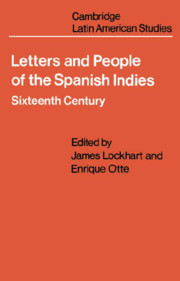Book contents
- Frontmatter
- Contents
- Preface
- Part I Conquest
- 1 Conquest in the personal view
- 2 A standard conqueror's report
- 3 The woman as conqueror
- 4 The merchant and the conquest of Peru
- 5 The merchant and the conquest of Mexico
- 6 The non-hero
- 7 The successful conqueror
- 8 The unsuccessful conqueror
- 9 The conqueror-governor
- 10 The conqueror in jail
- Part II The Variety of Life in the Indies
- Part III officials and Clerics
- Bibliography
- Index
7 - The successful conqueror
from Part I - Conquest
Published online by Cambridge University Press: 06 August 2018
- Frontmatter
- Contents
- Preface
- Part I Conquest
- 1 Conquest in the personal view
- 2 A standard conqueror's report
- 3 The woman as conqueror
- 4 The merchant and the conquest of Peru
- 5 The merchant and the conquest of Mexico
- 6 The non-hero
- 7 The successful conqueror
- 8 The unsuccessful conqueror
- 9 The conqueror-governor
- 10 The conqueror in jail
- Part II The Variety of Life in the Indies
- Part III officials and Clerics
- Bibliography
- Index
Summary
Melchor Verdugo, encomendero and councilman of Trujillo, Peru, to Marina de Olivares, his mother, in Avila, 1536
… I live in a place called Trujillo and have my house there and a very good encomienda of Indians, with about eight or ten thousand vassals …
The shares of treasure that the conquerors received, where there was treasure to be had, were only the beginning of their remuneration. As a more basic and permanent reward, first conquerors received encomiendas, which led in turn to other advantages. The full complex consisted of an encomienda with numerous settled, tribute-paying Indians and a large revenue; a large house, establishment and following in the nearest Spanish city; a seat on that city's council; and farflung enterprises of various types from stockraising to silver mining. This was success; to top it off the lucky conqueror would write home the news, at the same time sending money and proof of his credentials, in return for which he hoped to receive from the royal court certain status symbols, the most frequent being a coat of arms and a royal title to his council seat. The present letter illustrates all these things quite fully, being a classic example of the ‘Mother, I've made it’ message for sixteenth-century Spanish America. The reader should not be too annoyed at Verdugo'S transparent bragging; it was the manner of the time. As the young man says, ‘I write you this so you'll be glad.’ A more attractive side of him is seen in his longing for mail. And after saying he was not going to send his mother anything more, he in fact sent her 850 pesos (maybe meant for legal expenses), as well as some emeralds, a ring, a mirror, a comb, and some Indian textile things.
Except for those returning immediately to Spain, the vast majority of fIrst conquerors received encomiendas. But grants varied immensely. To support the kind of complex sketched above, there had to be sizable, stable Indian provincial entities with well-oiled tribute mechanisms, and even that availed little unless there was a steady supply of precious metals in the local economy so that the tribute could be turned into something of value to Europeans. Full success, then, was a rare thing indeed outside Peru and Mexico (one encomendero of Peru once said his grant was worth more than Chile).
- Type
- Chapter
- Information
- Letters and People of the Spanish IndiesSixteenth Century, pp. 43 - 46Publisher: Cambridge University PressPrint publication year: 1976



